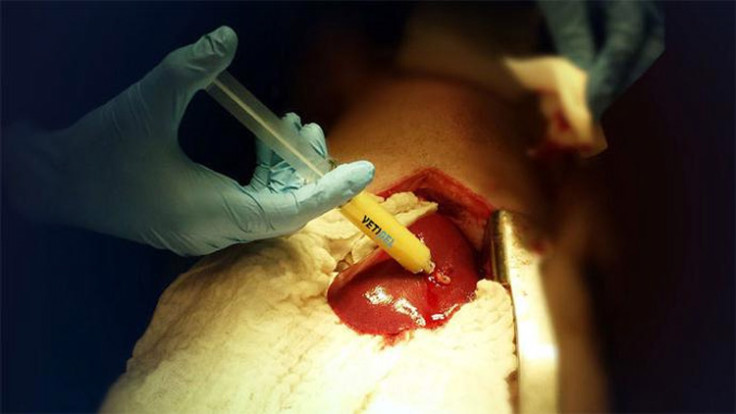Vetigel: The Plant-Based Gel That Stops Traumatic Bleeding Wounds in 15 Seconds

A graduate from Polytechnic Institute of New York University (NYU) has invented a gel that can stop bleeding and seal serious wounds in just 15 seconds, and hopes his invention will soon be used by the military, paramedics and even vets to save lives.
Vetigel works by using a plant-based haemophilic polymer made from polysaccharides that grab onto the blood and form a mesh that seals over the wound, without any need to apply pressure.
In a medical emergency, a first responder could simply apply the gel from a syringe-shaped applicator with no preparation required, and the bleeding will stop, which means that this could be a viable replacement for plasters and bandages today.
The gel is the brainchild of Joe Landolina, 21, the founder and CEO of Suneris, who came up with the concept when he was just 17 in 2010.
"I was always interested in science and my grandfather owned a winery, so from a really young age I learned how to work in a chemistry lab and had a love for chemistry," he told IBTimes UK.
"As I was playing around, I stumbled upon two polymers that when you mix them together, they become a solid mass. That was the Eureka moment for me."
Working on his invention after school
Landolina started a combined Undergraduate and Masters degree in chemical engineering and biomedical engineering with NYU a year later, but while many of his peers were enjoying being away from home and getting into university life, Landolina was working on building a startup company.
"I initially started with just classmates, but in the end it took four years of research, hiring PHD [researchers] and getting lots of lab equipment in to test and develop the product," he said.
"I did it after school and sometimes I even had to skip classes."
Luckily Landolina was supported by his university. In 2011, he took both the first prize in a competition held by NYU's engineering school, as well as second prize in another competition held by the business school.
From these two competitions he won $5,000 (£3,187) – just enough to start working on his idea, while his university mentored him with coaching on how to start a business and tried to help find private investors.
Today, Vetigel is still two years away from getting FDA approval to distribute the product in the US, so he is going down the veterinary route first.
"One of my very first employees was affiliated to the New York Aquarium, where they had lost an animal due to bleeding," he said.
"Veterinarians have almost no time to stop the bleeding before an animal dies. There's no product [to help], and there's a huge need for it in the market."
There are also less regulatory hurdles into getting into the market, and essentially Vetigel is ready to be launched, but Landolina wants to make sure that his manufacturing facilities are properly set up before putting out the product.
Getting Vetigel to market
The veterinary version of Vetigel will hopefully be available from early 2015 in the US and UK, followed by Europe, Asia, Australia and Africa.
Early estimates show that each application of the gel will roughly cost about $30 per application.
For the first FDA approval, Vetigel will need to be removed by a doctor or surgeon and the wound will need to be stitched up or treated the usual way in a hospital, but Landolina is also working on a version of the gel that can be left in the body and absorbed over time as the body's natural healing process takes place.
"For the veterinary field, the product is meant to be used internally. If you were to put it on the liver, within two weeks it would be absorbed into the organ," he said.
"It depends on where you put the product, but the technology is such that once you put it on, the clot will not reopen."
© Copyright IBTimes 2025. All rights reserved.






















